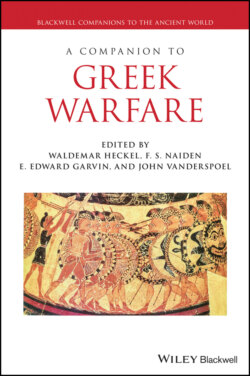Читать книгу A Companion to Greek Warfare - Группа авторов - Страница 22
The Lelantine War38 (Probably c. 710/700)
ОглавлениеAuthorities from different periods allude to the war as an actual event. Hesiod (floruit in the later eighth century) won a prize in the funeral games for the Chalcidean noble Amphidamas (Erg. 650ff.).39 If this man had been killed in action just before, as suggested by the games, the pertinent war took place c. 710/700. This accounts for the still Homeric practice of funeral games reminiscent of those for Patroclus (Il. 23), in the version we read from around 750.
Archilochus (c. 680–645) describes a war “on the plain,” being fought by “those spear-famed squires of Euboea” (fr. 3 Gerber).40 The character of the fighting is reminiscent of the aristeiai between noble single combatants in the Iliad,41 clearly before the introduction of the phalanx. In accordance with this, Strabo learned much later about Eretria and Chalcis: When quarrels arose between them “for the Lelantine Plain” they came to terms “under which they were to conduct the ‘strife’ (agon).” They engraved these terms on a stele “that banned long distance missiles … by archers, slingers and javelin-throwers” (10.1.12).42 The still entirely aristocratic agreement must belong to a very early time, albeit a stele with clauses of a treaty cannot have existed then; the detail was evidently invented later.
Also Theognis (second half of the sixth century) adopts a contemporary perspective on an Euboean war (v. 891–94 Gerber),43 the later sixth century being additionally confirmed by the fact that the mythological king Pheidon of Argos (mostly dated by the Greek tradition to this century) plays a role.44 Finally, the Lelantine Plain was conquered by the Athenians in 506 (Hdt. 5.74–77).
The 200 years from Hesiod to the Athenian conquest are far too much for one single war, even if it had some length. What we find in the Greek tradition must indeed be understood as a series of separate conflicts. The term in its proper sense applies to only one of them, probably that mentioned by Hesiod.45 It has been proposed to attach it to the series as a whole,46 but the tradition that “the whole Greek world[ 47] divided joining the party of one of the two” (Thuc. 1.15.3) runs counter to this view: it is impossible that such a deep division could have escaped the attention of our sources for the archaic period.
